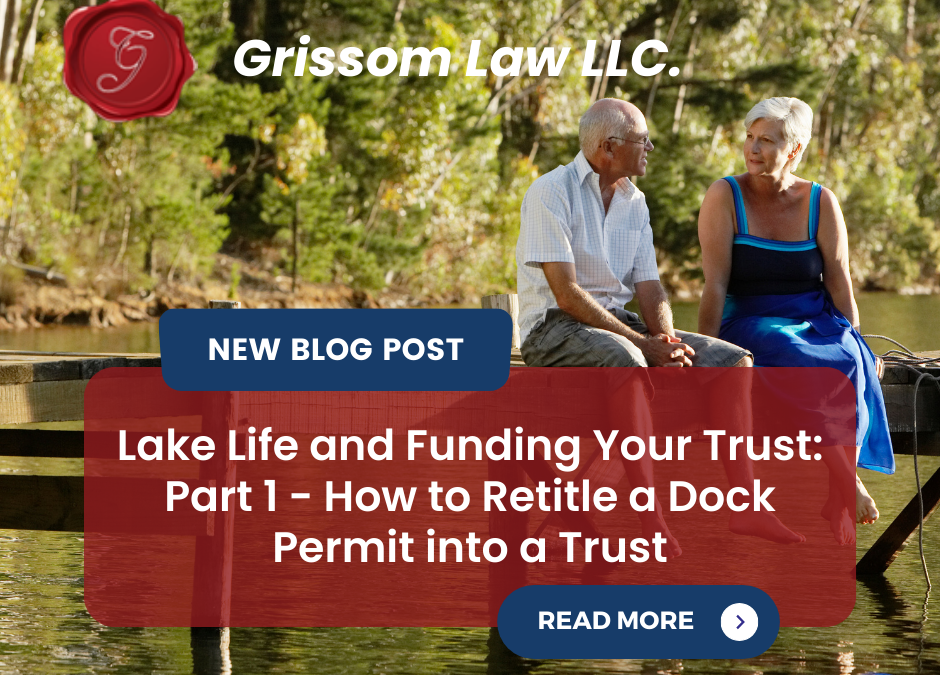Owning a dock often conjures images of peaceful sunsets, tranquil escapes and lazy summer afternoons casting lines into the water. It comes with a unique set of considerations, including the ownership and management of dock permits. But what happens when life changes and you want to transfer ownership of your home and its dock, perhaps to a trust? Transitioning a home with a dock permit into a trust can be a strategic move for various reasons. We work with our clients to provide guidance and support through the permit transfer process, ensuring your dock remains a haven for future enjoyment.
The first step is reviewing the documentation associated with the dock permit. Understand any restrictions, requirements, or regulations imposed by the relevant authorities, such as your local harbormasters, park authorities, or environmental agencies who oversee dock permits in different areas. It’s very important to ensure that transferring the permit into a trust complies with local laws and regulations.
With the initial research complete, the path to retitling your dock permit becomes a little bit clearer. Different lakes have different processes to transfer dock permits. Because our office is located close to Lake Lanier, we are providing the current information to transfer a dock permit to a trust for docks located on Lake Lanier. The included information is from the Corps of Engineers at Lake Lanier.
Once you have transferred your home that has a dock on Lake Lanier into your trust, you will need to collect and prepare the following:
- Your recorded Deed showing your trust as the new owner of the property. The recorded deed must show the County recording stamp, notary stamp and signature, the grantor’s signature and the property legal description.
- The most current survey or plat of the property showing property lines, measurements, and structures. The survey or plat must identify the lot number or physical address of the individual property.
- A detailed drawing of the existing dock that shows:
- Overall, outside dock dimensions
- All boat slip dimensions
- All walkway widths
- Overall, outside gangway dimensions
- A site drawing that must show:
- Corps of Engineers property line
- Private property lot lines
- Outline of the shoreline bank
- Pathway from private property to the dock
- Dock location on the shoreline
- Neighboring dock locations
- A completed Certificate of Authority
Additionally, you must provide:
- Name of the applicant (the trust’s name)
- A valid email address for the applicant/party responsible for the dock
- Phone numbers with voicemail for the applicant/party responsible for the dock
- Current mailing address that will be valid for at least the next 6 months.
- Lake location address and dock permit number, along with any gate codes, lock combinations, or key locations for accessing the facilities.
- Any special requests, modifications, or additions you would like on the permit.
All of this information must be provided to the Corps of Engineers either as paper submission at: Department of Army, Corps of Engineers, Lake Sidney Lanier Project Management Office, 1050 Buford Dam Road, Buford, GA 30518-5528 or via email to your area ranger.
By following these steps with help from an estate planning attorney, you’ll ensure a smooth transition and secure your dock’s future as a trusted family haven. Retitling lake property that includes a dock permit into a trust is a strategic move that requires adherence to legal procedures. By understanding the steps involved and seeking professional advice, retitling a dock permit can be a smooth transition and continued enjoyment for generations to come. By understanding the steps involved and seeking professional advice, you’ll secure a piece of waterfront tranquility for your beneficiaries, allowing them to create their own happy memories on the open water.
Contact our attorneys at Grissom Law, LLC, we can guide and ensure you a smooth transfer process. Remember, a little expert input can save you time, stress, and potential roadblocks.
Disclaimer
This Blog/Web Site is made available for educational purposes only as well as to give you general information and a general understanding of the law, not to provide legal advice. By using this blog site you understand that there is no attorney client relationship between you and Grissom Law, LLC.
